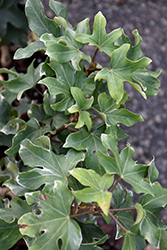Fri & Sat 8am - 8pm
Sun 8am - 7pm
Anytown, USA 12345
fax: 261.787.0463
e-mail: info@successgc.com


Plant Finder

Height: 3 feet
Spread: 3 feet
Sunlight:
![]()
![]()
Other Names: Curly Leafed Ivy, Tree Ivy, Aralia Ivy
Description:
This variety is considered a shrubby vine, presenting elegantly curled and twisted leaves that are shiny green with narrow white margins; a great way to add color to an indoor container ; non clinging, and does not climb without assistance
Features & Attributes
Curly Fatshedera's attractive twisted lobed leaves emerge chartreuse, turning dark green in color with distinctive white edges and tinges of grayish green throughout the year on a plant with an upright spreading habit of growth. The burgundy stems can be quite attractive and add to the plant's interest.
This is a multi-stemmed evergreen houseplant with an upright spreading habit of growth. This plant can be pruned at any time to keep it looking its best.
Planting & Growing
When grown indoors, Curly Fatshedera can be expected to grow to be about 3 feet tall at maturity, with a spread of 3 feet. It grows at a medium rate, and under ideal conditions can be expected to live for approximately 40 years. This houseplant performs well in both bright or indirect sunlight and strong artificial light, and can therefore be situated in almost any well-lit room or location. It does best in average to evenly moist soil, but will not tolerate standing water. The surface of the soil shouldn't be allowed to dry out completely, and so you should expect to water this plant once and possibly even twice each week. Be aware that your particular watering schedule may vary depending on its location in the room, the pot size, plant size and other conditions; if in doubt, ask one of our experts in the store for advice. It is not particular as to soil type or pH; an average potting soil should work just fine.
There are many factors that will affect the ultimate height, spread and overall performance of a plant when grown indoors; among them, the size of the pot it's growing in, the amount of light it receives, watering frequency, the pruning regimen and repotting schedule. Use the information described here as a guideline only; individual performance can and will vary. Please contact the store to speak with one of our experts if you are interested in further details concerning recommendations on pot size, watering, pruning, repotting, etc.
-- THIS IS A HOUSEPLANT AND IS NOT MEANT TO SURVIVE THE WINTER OUTDOORS IN OUR CLIMATE --
